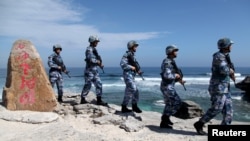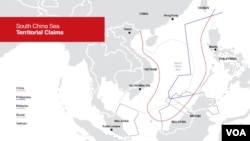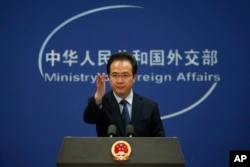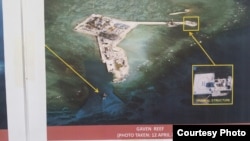China has stepped up efforts to defend its sovereignty claims in the disputed South China Sea by launching a week-long military drill around the Paracel Islands — a move that analysts say aims to de-legitimize an upcoming landmark international court decision.
Without giving details, the country’s maritime safety administration said that the naval drills would last till next Monday — one day before the International Court of Arbitration at the Hague is slated to reach a ruling in Beijing’s dispute with the Philippines, and cover an area from the east of China’s Hainan Island down to and including the entire Paracels.
Authorities in Beijing have repeatedly questioned the legality of the ruling by the tribunal, which is widely believed will rule in favor of the Philippines next Tuesday and may deprive China of any legal basis for its claims over almost the entire South China Sea, or the so-called Nine Dash Line.
“The arbitration court has no jurisdiction over the South China Sea dispute and its to-be-reached ruling will be illegal and invalid,” Chinese Foreign Ministry spokesman Hong Lei told a routine press conference on Monday, reiterating China’s stance.
Hong also lambasted the arbitration tribunal to be “the mouthpiece of some forces,” and accused the former Philippine government under Benigno Aquino, which brought up the arbitration three years ago, of “fabricating lies.”
Following the harsh words, this week’s military drills were thus “meant to signal China’s unbowing stance toward external pressure” and its determination to back up its claims in the disputed waters, according to Tang Siew Mun, a senior fellow at the regional strategic and political studies program under the ISEAS-Yusof Ishak Institute.
A reminder of Beijing’s strength
“Seen from another angle, it could also serve as a reminder of China’s military power and its willingness to deploy such means to protect its national interest,” Tang wrote in an emailed reply to VOA.
In addition to ignoring the ruling, China will maximize its room for political maneuver, the Singapore-based researcher added.
China will further rally support among its diplomatic allies to discredit the ruling and try to influence the Philippines’ new President Rodrigo Durtete, through economic inducements, to downplay it. It will also lobby hard among its southeastern Asian allies to scuttle attempts to issue a statement on the ruling while planning a round of gunboat diplomacy, which implies a direct threat of warfare, to remind other claimants of Beijing’s strength, the Singapore-based researcher added.
Already in mid-June, China pressured the Association of Southeast Asian Nations (ASEAN) into retracting a strongly-worded statement, which expressed the region’s deep concerns over tension in the disputed South China Sea. Prior to its recall, the statement warned the region’s recent and ongoing developments “may have the potential to undermine peace, security and stability.”
Despite China’s increased aggression to lay markers down in the disputed waterway, some argue that it is significant to note that the military exercises are taking place around the Paracel Islands, which are under China’s control, instead of the controversial Spratlys, where the Philippines has a presence. One possible way to look at the choice of venue may mean that China has no intention to provoke, they argue.
Limited provocation
“It’s only speculation. It might just be logistics that confine the operation to that area. But it also could be a deliberate, political statement of limited exercise that shows ability and intent to intervene, but not too provocative,” James Nolt, a senior fellow at the World Policy Institute, told VOA.
Last week, director of the U.S. Central Intelligence Agency John Brennan reaffirmed the U.S.’s national-security interests in Asia. “The U.S. treats this region of the world very seriously, and we have very important national-security interests that we're not going to step away from,” Brennan said in Washington, adding that China’s growing military influence in the South China Sea is the reason for the U.S. to pay attention to what China is doing on all fronts.
However, Nolt believed that the chance of warfare in the region will be limited, as a shooting war is highly unfavorable to all kinds of relationships in the region, be it political or economic, and would send jitters throughout the world’s financial markets.
“Both sides will just continue to build up their presence in the near area in order to state their claims with the hope that eventually there will be some kind of negotiated resolution when every party realizes that they can’t accomplish their maximized goals by force,” Nolt added.








